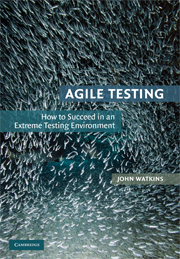Book contents
- Frontmatter
- Contents
- Foreword by Bob Bartlett
- Acknowledgments
- 1 Introduction
- PART 1 REVIEW OF OLD-SCHOOL AND AGILE APPROACHES
- PART 2 EVERYONE IS DIFFERENT: AGILE CASE STUDIES
- 4 From Waterfall to Evolutionary Development and Test
- 5 How to Test a System That Is Never Finished
- 6 Implementing an Agile Testing Approach
- 7 Agile Testing in a Remote or Virtual Desktop Environment
- 8 Testing a Derivatives Trading System in an Uncooperative Environment
- 9 A Mixed Approach to System Development and Testing: Parallel Agile and Waterfall Approach Streams within a Single Project
- 10 Agile Migration and Testing of a Large-Scale Financial System
- 11 Agile Testing with Mock Objects: A CAST-Based Approach
- 12 Agile Testing – Learning from Your Own Mistakes
- 13 Agile: The Emperor's New Test Plan?
- 14 The Power of Continuous Integration Builds and Agile Development
- 15 The Payoffs and Perils of Offshored Agile Projects
- 16 The Basic Rules of Quality and Management Still Apply to Agile
- 17 Test-Infecting a Development Team
- 18 Agile Success Through Test Automation: An eXtreme Approach
- 19 Talking, Saying, and Listening: Communication in Agile Teams
- 20 Very-Small-Scale Agile Development and Testing of a Wiki
- 21 Agile Special Tactics: SOA Projects
- 22 The Agile Test-Driven Methodology Experiment
- 23 When Is a Scrum Not a Scrum?
- PART 3 AGILE MY WAY: A PROPOSAL FOR YOUR OWN AGILE TEST PROCESS
- APPENDIX A The Principles of Rapid Application Development
- APPENDIX B The Rules and Practices of Extreme Programming
- Appendix C The Principles of the Dynamic Systems Development Method
- Appendix D The Practices of Scrum
- APPENDIX E Agile Test Script Template
- Appendix F Agile Test Result Record Form Template
- Appendix G Agile Test Summary Report Template
- Appendix H My Agile Process Checklist
- References
- Index
20 - Very-Small-Scale Agile Development and Testing of a Wiki
Published online by Cambridge University Press: 26 October 2009
- Frontmatter
- Contents
- Foreword by Bob Bartlett
- Acknowledgments
- 1 Introduction
- PART 1 REVIEW OF OLD-SCHOOL AND AGILE APPROACHES
- PART 2 EVERYONE IS DIFFERENT: AGILE CASE STUDIES
- 4 From Waterfall to Evolutionary Development and Test
- 5 How to Test a System That Is Never Finished
- 6 Implementing an Agile Testing Approach
- 7 Agile Testing in a Remote or Virtual Desktop Environment
- 8 Testing a Derivatives Trading System in an Uncooperative Environment
- 9 A Mixed Approach to System Development and Testing: Parallel Agile and Waterfall Approach Streams within a Single Project
- 10 Agile Migration and Testing of a Large-Scale Financial System
- 11 Agile Testing with Mock Objects: A CAST-Based Approach
- 12 Agile Testing – Learning from Your Own Mistakes
- 13 Agile: The Emperor's New Test Plan?
- 14 The Power of Continuous Integration Builds and Agile Development
- 15 The Payoffs and Perils of Offshored Agile Projects
- 16 The Basic Rules of Quality and Management Still Apply to Agile
- 17 Test-Infecting a Development Team
- 18 Agile Success Through Test Automation: An eXtreme Approach
- 19 Talking, Saying, and Listening: Communication in Agile Teams
- 20 Very-Small-Scale Agile Development and Testing of a Wiki
- 21 Agile Special Tactics: SOA Projects
- 22 The Agile Test-Driven Methodology Experiment
- 23 When Is a Scrum Not a Scrum?
- PART 3 AGILE MY WAY: A PROPOSAL FOR YOUR OWN AGILE TEST PROCESS
- APPENDIX A The Principles of Rapid Application Development
- APPENDIX B The Rules and Practices of Extreme Programming
- Appendix C The Principles of the Dynamic Systems Development Method
- Appendix D The Practices of Scrum
- APPENDIX E Agile Test Script Template
- Appendix F Agile Test Result Record Form Template
- Appendix G Agile Test Summary Report Template
- Appendix H My Agile Process Checklist
- References
- Index
Summary
SYNOPSIS
This case study reviews an agile approach to the development, testing, and delivery of a Wiki in very short timescales, with chronically low budget, and with very few resources. There were a number of potential risk issues with the project, such as difficulties with co-location of the customer and the project manager, but which were successfully mitigated by intelligent use of collaborative technologies such as instant messaging and teleconferencing.
Overall, the project was very successful, delivering precisely the system the customer needed, and with good quality. The only significant issue that could be reported was that the original delivery timescales of four weeks overran by one week, although this was actually due to deliberate enhancements requested by the customer.
I also make some suggestions for improvements to the agile development and test process that I would use on future projects.
Introduction
My name is Dass Chana and I am a computer science student. This case study describes a project I undertook as an industrial placement student working for a very large IT company. I was assigned as a resource to a large distributed team who were responsible for providing technical support to the company's business partners, and tasked with setting up and delivering a Wiki (for internal use within the team) under very challenging timescales, with extremely low budget, and with very few resources.
- Type
- Chapter
- Information
- Agile TestingHow to Succeed in an Extreme Testing Environment, pp. 151 - 159Publisher: Cambridge University PressPrint publication year: 2009



